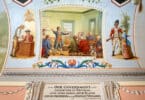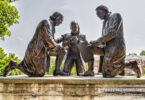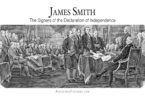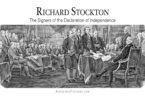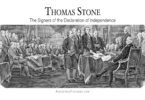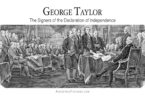Abraham Clark is one of those signers of the Declaration of Independence who is not nearly as well known as some of the others. In fact, he has largely been forgotten by history, except for his signature on that famous document. This seeming low level of notoriety in history does not mean that Abraham lived an uneventful or unimportant life. In fact, it was quite the opposite. His life was an interesting one, and one of importance to American history. It is time his story was rediscovered.
Abraham Clark was born in 1726 in Elizabethtown, New Jersey. Little is known about his early childhood or family. One of the few details left to us by history is that his family was a farming one and that he was too weak and frail as a child to do farm work. Abraham did, however, show an aptitude for mathematics at an early age, something his father, Thomas, noticed. Wanting his son to have a profitable future, Thomas hired a tutor for Abraham to teach him land surveying.
Abraham took it one step further and taught himself law while working as a surveyor. Once he felt he had learned enough to be a lawyer, he took the bar exam, passed it, and set up a law practice for himself in New Jersey. His practice became a popular one among the less prosperous folks of New Jersey, as he often offered to defend people for free when they needed a lawyer and could not afford one. This affinity for the common man earned him the nickname “the poor man’s councilor.”
In 1749, Abraham got married. His bride was Sarah Hatfield. Together, Abraham and Sarah had ten children. Sarah did most of the child-rearing herself on their farm, while Abraham used his position as a lawyer to enter into politics at the local level. He became a clerk of the Provincial Assembly of New Jersey. After serving in this position for a while, Abraham also became the High Sheriff of Essex County in New Jersey. A few years after that, he was elected to the Provincial Congress and was chosen as a member of that group’s Committee for Public Safety.
While Abraham was serving the Provincial Assembly, the colony of New Jersey had delegates serving at the Continental Congress in Philadelphia. The New Jersey delegation was opposed to independence from Great Britain, with their members feeling the colonies were not mature enough for this, and that their army would be no match for the larger and better-powered army of Great Britain. Because the public attitude to independence in New Jersey was positive, the Provincial Congress wanted people at the Continental Congress whose views would reflect the public sentiment. They recalled their delegates and replaced them with new, pro-independence ones. Abraham was asked to be one of these new delegates.
Abraham was a natural choice to go to the Continental Congress. He had been a vocal and adamant advocate of independence from the beginning when it was first brought up as an issue in the colonies. Others who joined Abraham in the new New Jersey delegation to the Continental Congress were John Witherspoon, Francis Hopkinson, and Richard Stockton. The group arrived in Philadelphia only a few days before the crucial vote on whether or not to ratify the Declaration of Independence. According to the new rules of the Congress for just this vote, the vote had to be unanimous for the Declaration to be ratified. Naturally, the New Jersey delegation, including Abraham, voted in favor of it.
Abraham put his signature on the Declaration of Independence along with the other New Jersey delegates, and he did so at great personal cost, though the other members of the Continental Congress did not know it at first. At the time of his signature, there were two of his sons who were serving as officers in the Continental Army, fighting for independence against Great Britain. Those two sons were both captured by British ships and were tortured and beaten by their British captors. Abraham knew of this and never brought it up at the Continental Congress. When the British offered the release of Abraham’s sons to him if he would recant his signing of the Declaration and withdraw his support of it, he refused. He believed that those in power should be offered no special treatment above the common man.
It was only when his two sons were transferred to a British prison ship that was notorious for the brutal way it treated its prisoners that Abraham finally said something about it to the Continental Congress. At this point, one of his sons was being kept in a dungeon on the ship without being fed–he only ate what little food his fellow prisoners were able to shove through the keyhole to his room. The other members of the Continental Congress were horrified at this news and appealed to the British on Abraham’s sons’ behalf. After this intervention by the Congress, the conditions of Abraham’s sons were improved, although they remained as British prisoners until the war was settled.
Abraham stayed on at the Continental Congress for two years, which was longer than most. When he left it, he was elected to the New Jersey Legislative Council as the member from Essex County. Abraham went back to the Continental Congress twice more at New Jersey’s request, once from 1780 to 1783, and once from 1786 to 1788.
Clark remained in the Continental Congress through 1778, when he was elected as Essex County’s Member of the New Jersey Legislative Council. New Jersey returned him twice more, from 1780 to 1783, and from 1786 to 1788.
Abraham was especially unique among the other delegates to the Continental Congress in being not only a proponent of democracy but a particularly vocal proponent for the rights of the common man. Most of the elites on the Congress did not express such care for the common man as Abraham. The elevation of the opinion of the societal roles of mechanics and farmers was especially important to him. Since both of these professions produced things that other people used across the colonies, Abraham viewed these professions as essential to a virtuous society. Abraham also denounced the role of creditor to the common man that the elites on the Continental Congress often played. He viewed the creditor role of the aristocrats as a threat to the future of the democratic republic form of government the Congress said it wanted to establish.
In fact, while many of the Founding Fathers demanded that the common man give deference to elected officials and to treat them like British aristocracy, Abraham encouraged his own constituents to petition their elected officials when they wanted change or believed it was necessary. With the assistance of the thousands of petitions he himself had received from constituents, Abraham was able to push a pro-debtor paper money bill through the New Jersey legislature in May of 1786.
Abraham Clark retired in 1794, before the state’s Constitutional Convention–though he had been an outspoken proponent of a Bill of Rights being included in any constitution before it was ratified. He also advocated for the word “Liberty” to be stamped on national coins instead of the images of presidents.
Shortly after his retirement, Abraham died of sunstroke while watching a bridge being built on his farm. He was buried at the Rahway Cemetery in Rahway, New Jersey, where he lived. Clark Township in Union County is named after him, as is Abraham Clark High School in the New Jersey town of Roselle.

